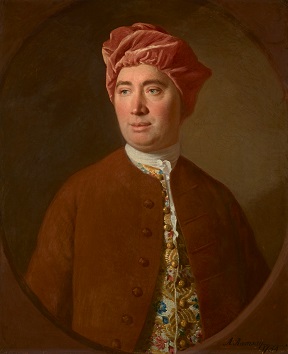Liberty Matters
Liberty and English Exceptionalism

The individual is the starting point of Hume's science of man. Both the Treatise and the Enquiries explain how an individual can come to terms with a social context (sympathy). The social world is not fully constitutive of who we are; it depends on how we come to understand that context and whether we choose to absorb it, modify it, fritter it away, or abandon it.
As Hume made clear in an appendix to the Enquiries, while there are universal truths about human beings, humans develop in different historical and cultural contexts. Hume was not the first to engage in historical explication. Outside of England, Montesquieu (who had studied law) noted, in 1748 in The Spirit of the Laws, before Hume began publishing his History (1754), some unique features of English history. Hume corresponded with Montesquieu and shared much of his perspective. They identified three types of regime: despotic, civilized monarchies, and constitutions based on liberty – of which England is the shining example. Both Hume and Montesquieu are concerned with individual liberty. Representative government is a means to liberty not the essence of liberty. Both begin with Tacitus and the "liberty" of the Britons (H, I, 5).
There is something special about England. From that relevant history, individualism and individual liberty emerged as prioritized norms. Hume gives a history of how liberty emerged (evolved) in the specifically English context from the time of the Britons and Saxons up to his own time. He insists that it evolved (no ancient constitution) through a series of practices and was well instantiated in his own time in a variety of legal and political practices. One such practice was habeas corpus (later praised by Dicey as the greatest guarantee of individual liberty). Habeas corpus preceded both Magna Carta and the Normans.
The claim I make on behalf of Hume (and others) is that there are certain features of the English conception of liberty that are rather exceptional, and that is the result of something special about English history. Certainly some of his contemporaries thought so (Voltaire, Montesquieu, Constant, authors of the Federalist Papers) and hoped to see those features adopted elsewhere. In retrospect, some of those features such as the presumption of innocence and habeas corpus have been subsequently adopted elsewhere. Nevertheless, those features developed originally in the English context, and they may well continue to mean something slightly different in different cultural contexts.
Where I think I may differ from others is in my maintaining that the meaning of an institution or a specific practice depends on the larger cultural context. Nazi Germany, China, Iran, and the Soviet Union all claim to have had or have the rule of law. Surely it means something very different in the Anglo-American context. The cultural origin explains not just the starting point, but may also explain the evolution and meaning.
The rule of law is specifically Anglo-American; what other legal systems have is more rule through law (mere legality). There is a large and growing scholarly literature on this. Those who deny the sanctity of individualism and reject classical liberalism are exactly those (Raz, Rawls, Dworkin) who denigrate the rule of law or reduce it to a formality or do not even discuss it, and who advocate some form of equality at the expense of liberty. Liberty never stops needing an articulation and a defense.
Although Continental Europe may have started in a similar fashion, it is only the Angles and Saxons who preserved some early version of individual liberty. The Germanic tribes that swept through the Continent were Romanized and later adopted a very different legal system. I would maintain that some version of a classical collective good permeates Continental thinking to this day. There are important historical studies of why classical liberalism did not prosper in Continental Europe in the 19th and 20th centuries. Post-World War II, the Germans created a constitution that gives the individual certain protections (abstract human rights), but the constitution is a product of democratic politics (very un-Humean and un-English), and Continental thinkers in general, with the exception of the Anglophiles, believe that majority rule gives us access to something like the general will – ideas that would be anathema in the Anglo-American context.
English thinkers have long been cognizant of their difference from Continental Europe. If I had more space I would detail the myriad ways in which English culture stands out in making the individual the primary focus (everything from Protestantism and the novel to UK corporate practice). To the best of my knowledge, the English language is the only one in which the first person singular pronoun ("I") is always capitalized.
Copyright and Fair Use Statement
“Liberty Matters” is the copyright of Liberty Fund, Inc. This material is put on line to further the educational goals of Liberty Fund, Inc. These essays and responses may be quoted and otherwise used under “fair use” provisions for educational and academic purposes. To reprint these essays in course booklets requires the prior permission of Liberty Fund, Inc. Please contact oll@libertyfund.org if you have any questions.